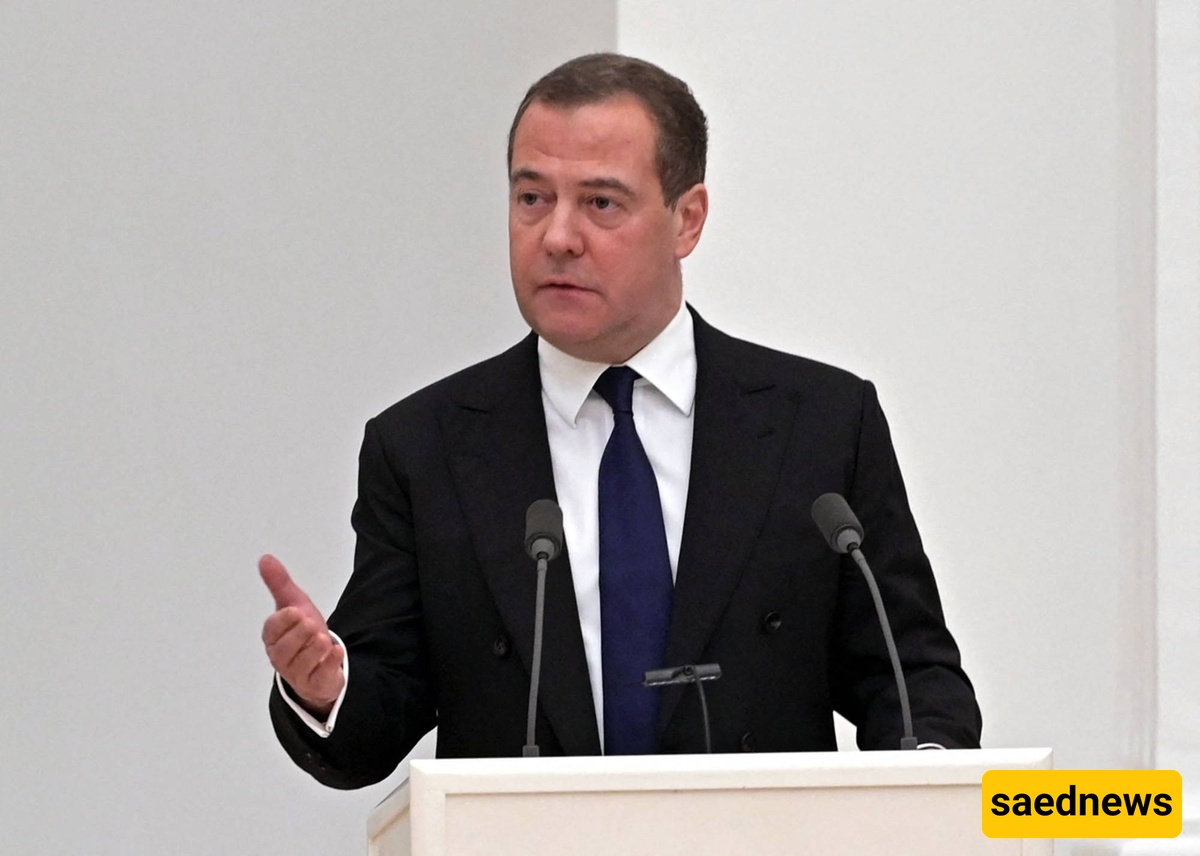SAEDNEWS: Dmitry Medvedev has now emerged as one of the most outspoken and hardline voices within Russia’s political establishment. This analytical report examines Medvedev’s political trajectory, the evolution of his positions, and his current role within the Kremlin’s power structure.

According to Saed News, citing CNN, Dmitry Medvedev — once hailed as a symbol of reform and modernization in Russian politics — has now become one of the most vocal and radical hardline voices within the Kremlin’s power structure. Having ascended to the presidency in 2008 with the backing of Vladimir Putin, Medvedev was initially seen as a harbinger of reform, engagement with the West, and a revitalization of Russia’s domestic political landscape. Today, however, his fiery and at times provocative rhetoric — whether in the form of direct threats to the West or justifications for Russia’s military aggression — presents a starkly different and deeply contrasting image.
These developments reflect not only a dramatic shift in Medvedev’s political persona but also highlight the internal complexities of Russia’s current power system.
In the years following Putin’s first presidency, when talk of reform and modernization was gaining traction, Medvedev entered the Kremlin as a technocratic, Western-educated, and relatively liberal figure. Fluent in English, supportive of emerging technologies, and perceived as more measured than many of Russia’s traditional leaders, Medvedev focused his presidency on legal reform, the development of information technology, and efforts to combat corruption. Yet none of these initiatives could eclipse Putin’s dominant presence. Russia’s political system remained structured in a way that left real power in the hands of then-Prime Minister Putin. Many analysts believed that Medvedev merely served as a placeholder to ensure a seamless formal transition of power.
With Vladimir Putin’s return to the presidency in 2012, Dmitry Medvedev was appointed Prime Minister, effectively relegated once again to the second tier of the power hierarchy. At that stage, he sought to maintain his technocratic image and position himself as the more modern face of the government. However, faced with increasing constraints, his voice grew quieter and less influential. Gradually, his popularity among educated segments and reform-minded supporters waned, as his unwavering loyalty to Putin and inability to pursue promised reforms sparked widespread disappointment.
A turning point in Medvedev’s rhetoric and behaviour emerged following the Ukraine crisis in 2014, and particularly after Russia’s invasion of Ukraine in 2022. Once an advocate for closer ties with the West, he has since become one of its fiercest critics, especially targeting the United States and NATO. His statements on social media — especially on Telegram — have been filled with blunt threats against European countries, nuclear warnings, and forceful defences of the Kremlin’s aggressive policies. Many online commentators and Western analysts describe his tone as provocative, infused with ultranationalism, and at times, undiplomatic.
This shift in Medvedev’s rhetoric cannot be explained solely by personal ideological change. In Russia’s tightly controlled and security-driven political system, political survival depends on one’s degree of loyalty, ability to adapt to the prevailing ideological climate, and visible alignment with Kremlin policies. Medvedev has clearly understood that to remain within the decision-making circle and retain his status, he must project an image of unwavering — even exaggerated — loyalty. This phenomenon, known as “loyalty competition,” is common in authoritarian systems, where officials at times adopt positions even more extreme than the leader’s to demonstrate their commitment.
Nevertheless, reactions within Russian society and the political elite to Medvedev’s ideological shift have been mixed. Some view him as a conservative operator merely seeking to protect his position, interpreting his changed rhetoric as strategic and calculated. Others argue that Medvedev has undergone a genuine ideological transformation, and can no longer be regarded as the liberal figure of the previous decade. In either case, the message is clear: in post-2022 Russia, even figures once seen as symbols of moderation and dialogue have now joined the ranks of hawks and military hardliners.
One notable aspect of Dmitry Medvedev’s transformation is his extensive use of modern communication tools, particularly social media platforms, to express his views. At a time when many domestic critics face censorship and repression, Medvedev enjoys unfettered access to both official and unofficial platforms to convey government positions—often with rhetoric more hardline than the Kremlin’s own spokespersons. This deliberate use of media has led some observers to label him the Kremlin’s “aggressive loudspeaker,” tasked with gauging public reaction to the regime’s most extreme positions.
At the same time, Medvedev’s formal role has also shifted. He currently serves as Deputy Chairman of Russia’s Security Council—a position that, while not executive in nature, has gained strategic significance amid rising international tensions. His participation in security meetings, vocal support for military operations, and frequent visits with senior military commanders all point to a role that, while somewhat in the background, is far from inconsequential.
Medvedev’s political trajectory can be seen as emblematic of broader trends in Russian politics over the past two decades—a landscape in which “softline” politicians are either marginalised or gradually absorbed into the dominant ideological framework. In such an environment, political individuality holds little currency, and survival depends largely on one’s ability to align with the will of the central power. Medvedev, with all his political and personal complexities, serves as a clear illustration of this mechanism: once a symbol of hope for change, he is now among the loudest ideological voices within Russia’s ruling elite.

